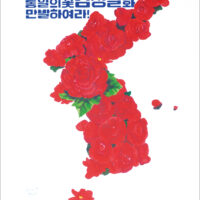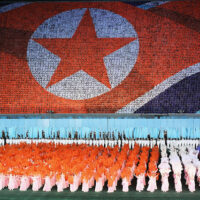What follows is an extensive interview with Yongho Thae, Minister of the Embassy of the Democratic People’s Republic of Korea in London, conducted by Carlos Martinez. The interview took place at the DPRK embassy in London in October 2013. Topics covered include the DPRK’s nuclear programme, the nature of the DPRK’s political system, the DPRK’s place in a changing global political landscape, tourism, Syria, and Latin America. Given that the DPRK is considered by the imperialist states as ‘enemy number one’, it is essential for anti-imperialists to make an effort to understand and defend it.
The western media narrative claims that DPR Korea’s nuclear programme is a major threat to world peace. Why does the DPRK have nuclear weapons?
When the western press comments on the nuclear programme of the DPRK, it never talks about the core reasons behind that programme; it is only interested in justifying US bullying; it wants people to be blind to the underlying logic of our position. Our policy is simple and easy to understand: we need a nuclear deterrent.
Before I go into this issue, I’d like to clarify that it is still the DPRK’s policy to denuclearise the Korean peninsula. It has always been our policy to get our country out of the threat of nuclear war. In order to reach that aim, there was no choice but to develop our own nuclear capacity.
After the Second World War, the US was the only country in the world that had nuclear weapons. In order to further their strategy of global domination, they decided to use an atomic bomb against Japan. The facts show that there was no need for the US to use such a weapon in that situation. In Europe, in May 1945, Hitler was defeated and the war ended. In the Pacific, the tide had turned totally against Japanese imperialism. It was obvious that the Soviet army would take part in the war against Japan, and Japan was losing the war with the US. It was just a matter of time before the Japanese war effort collapsed. Japan could not win against the combined forces of the Soviet Union, Europe, China and the US, so they were looking for a way out. There was absolutely no need for the US to use nuclear weapons. Inside the US establishment, there were fierce arguments as to whether these weapons should be used. The people of the world didn’t understand about the destructive power of nuclear weapons – only US leaders knew. They wanted the world to find out about how mighty these weapons were, so that the world would be forced to go along with US policy. In order to achieve this aim, they didn’t take into account how many lives would be lost. To them, the lives of ordinary Japanese people are like the lives of dogs, of animals. They would kill as many as possible in support of their geopolitical aims.
So the US dropped atomic bombs on Hiroshima and Nagasaki. Later on the USSR developed nuclear weapons too. As time went on, the Soviet nuclear arsenal played the role of counterbalancing the possibility of US nuclear weapon usage. That is the main reason that the US couldn’t use these weapons in the second half of the 20th century. Later on the nuclear weapons club was expanded to include China, Britain and France. In terms of world peace as a whole, the enlargement of the nuclear club would intuitively be seen as a bad thing, but the reality was that the possession of nuclear weapons by China and the Soviet Union was able to check the use of nuclear weapons by anyone for any purposes. I think this is a fact we should admit.
As far as Korea is concerned, you know that Korea is just next door to Japan. Many Japanese lived in Korea, because Korea was a colony of Japan. Our media system at the time was run by Japanese. So when Hiroshima and Nagasaki occurred, we heard about it and we understood very well the scale of this disaster. The Korean people understood very well how many people were killed in the space of just a minute. So the Korean people have a very direct experience of nuclear warfare from the beginning.
The Korean War started in 1950. The Americans thought they could easily win this war, because they had all the advanced conventional weapons and they mobilised 16 satellite countries. At this time China was only just liberated – the People’s Republic of China was just one year old. Meanwhile the Soviet Union was still recovering from the vast destruction of the Second World War. So, the US thought it could easily win the Korean War. However, they found out that their arrogance was misplaced. In fact, the Korean War was the first war that checked US ambitions.
The Korean People’s Army and the Chinese volunteers fought with incredible strength against the US. From the US point of view, this was a war against communism. But the communists had the full support of the people of these countries. Korea and China were rural countries, where the people were motivated by the idea of getting their own land. It is the Communist Party – the Workers’ Party of Korea – that distributed land equally to all farmers. So the WPK had the full support of the people, and the masses of the people took part in the Korean War. They knew the situation of their brothers and sisters in South Korea – dominated by landlords and US interests – and understood that if the DPRK lost the war, the rule of the landlords would be restored and the land reform reversed. So that is why the ordinary Korean people got involved. Everybody got involved and did not hesitate to make every sacrifice.
When he saw that the war was not going according to plan, Eisenhower asked his advisers: how can we win this war? The American generals suggested using the nuclear threat. The US felt that if they warned the population that they were going to drop a nuclear bomb, the people would flee from the front. Having witnessed the effects of nuclear warfare just five years previously, millions of people fled North Korea and went to the south. The result of this is that there are still 10 million separated families.
So you can see that the Korean people are the direct victims of nuclear bullying – us more so than anybody in the world. The nuclear issue is not an abstract one for us; it is something we have to take very seriously.
After the Korean War, the US never stopped its hostile policy towards Korea. Today they say that they cannot normalise relations with the DPRK because the DPRK has nuclear weapons. But in the 60s, 70s and 80s, we didn’t have nuclear weapons – did they normalise relations then? No. Rather, they continued trying to dominate the Korean peninsula with their own military force. It is the US that introduced nuclear weapons on the Korean peninsula. In the 70s, in order to check the influence of the Soviet Union, they deployed nuclear weapons in Europe and also in South Korea. The US never stopped threatening the DPRK with these weapons, which were just next to us, the other side of the demilitarised zone. Korea is a very small country, with a high population density. It is quite clear that if the US used its nuclear weapons, the scale of the humanitarian catastrophe would be unimaginable.
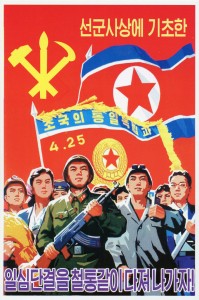 The DPRK government had to find a strategy to prevent the US from using these weapons against us. In the 1970s, there were discussions among the big powers as to how they could prevent nuclear war. What the big five counties agreed is that they would stop the proliferation of nuclear weapons. Only five countries would be allowed to have nuclear weapons; the others would not. The Non-Proliferation Treaty (NPT) was born in 1970. The NPT clearly states that nuclear power states cannot use nuclear weapons for the purpose of threatening or endangering non-nuclear states. So the DPRK thought that if we joined the NPT, we would be able to get rid of the nuclear threat from the US. Therefore we joined. However, the US never withdrew its right of pre-emptive nuclear strike. They always said that, once US interests are threatened, they always have the right to use their nuclear weapons for pre-emptive purposes. So it’s quite obvious that the NPT cannot ensure our safety. On this basis, we decided to withdraw and to formulate a different strategy to protect ourselves.
The DPRK government had to find a strategy to prevent the US from using these weapons against us. In the 1970s, there were discussions among the big powers as to how they could prevent nuclear war. What the big five counties agreed is that they would stop the proliferation of nuclear weapons. Only five countries would be allowed to have nuclear weapons; the others would not. The Non-Proliferation Treaty (NPT) was born in 1970. The NPT clearly states that nuclear power states cannot use nuclear weapons for the purpose of threatening or endangering non-nuclear states. So the DPRK thought that if we joined the NPT, we would be able to get rid of the nuclear threat from the US. Therefore we joined. However, the US never withdrew its right of pre-emptive nuclear strike. They always said that, once US interests are threatened, they always have the right to use their nuclear weapons for pre-emptive purposes. So it’s quite obvious that the NPT cannot ensure our safety. On this basis, we decided to withdraw and to formulate a different strategy to protect ourselves.
The world situation changed again after 11 September 2001. After this, Bush said that if the US wants to protect its safety, then it must remove the ‘axis of evil’ countries from the earth. The three countries he listed as members of this ‘axis of evil’ were Iran, Iraq and North Korea. Bush said that, in order to remove these evils from the earth, the US would not hesitate even to use nuclear weapons. Events since then have proved that this was not a simply rhetorical threat – they have carried out this threat against Afghanistan and Iraq.
Now it comes to North Korea. There was DPRK Framework Agreement between the Clinton administration and the DPRK in 1994, but the Bush administration canceled this, saying that America should not negotiate with evil. The neo-cons said that ‘evil states’ should be removed by force. Having witnessed what happened in Afghanistan and Iraq, we came to realise that we couldn’t put a stop to the threat from the US with conventional weapons alone. So we realised that we needed our own nuclear weapons in order to defend the DPRK and its people.
In additional to the direct nuclear threat, I must point out that there is also the issue of the ‘nuclear umbrella’. The US extends its nuclear umbrella to its friends, such as Japan, South Korea and the Nato countries. But Russia and China aren’t willing to open up a nuclear umbrella to other countries, because they are afraid of the response from the US. We realised that no country will protect us from US nuclear weapons, and therefore we came to understand that we must develop our own.
We can say now that the choice to develop our own nuclear deterrent force was a correct decision. What happened to Libya? When Gaddafi wanted to improve Libya’s relations with the US and UK, the imperialists said that in order to attract international investment he would have to give up his weapons programmes. Gaddafi even said that he would visit the DPRK to convince us to give up our nuclear programme. But once Libya dismantled all its nuclear programmes and this was confirmed by western intelligence, the west changed its tune. This led to a situation where Gaddafi could not protect Libya’s sovereignty; he could not even protect his own life. This is an important historical lesson.
The DPRK wants to protect its security. We ask the US to give up its hostile policy; to give up its military threat; to normalise relations with the DPRK; to replace the armistice treaty with a peace treaty. Only when the American military threat against the DPRK is removed; only when peace-guaranteeing mechanisms are established on the Korean peninsula; only then can we talk of giving up our nuclear weapons. In other words, the US should take the issue seriously; it should take a positive approach to solve this matter.
We are proud that, even though there is a huge US military presence in the Korean peninsula and in northeast Asia, so far we have been very successful in preventing another war on the Korean peninsula. The US war machine never stops. Vietnam, Afghanistan, Iraq, Libya and now Syria… every day, hundreds of innocent people are dying because of imperialist policy led by the US. But after the Korean War finished in 1953, the DPRK has been able to maintain peace on the Korean peninsula, and we think this is a great achievement.
Were you hopeful that, with the election of Barack Obama, the US position on Korea would improve?
Well, Obama’s policy is different from that of Bush and the conservatives. Instead of solving these problems directly, he is moving to a position of ‘strategic neglect’. Obama wants to keep the issue as it is rather than taking real steps to improve the situation. The current administration says that there are too many pending issues for the US to solve.
There have been some interesting visits to the DPRK recently, for example by Eric Schmidt, CEO of Google, and by Dennis Rodman, the basketball star. Do these perhaps – even in a very small way – indicate that there are some people within US ruling circles that are interested in improving relations with the DPRK?
It’s very difficult to say whether those visits will have a positive influence. What the DPRK wants to do is to deliver a message to the American people that the DPRK is always willing to address and solve problems; that the DPRK wants to improve its relations with the US; that the DPRK does not consider the US as its permanent enemy. We hope that these visits of prominent US citizens will help to convey this message.
Do any of the other imperialist powers – for example Britain, France, Australia – have a more constructive position in relation to the DPRK, or do they follow the US lead?
There is a bit of a different approach. For instance, the US government has never extended diplomatic recognition to the DPRK as a sovereign state, whereas US allies such as Britain and Australia do accept our existence; these countries support a policy of engagement with the DPRK.
Does the US still maintain nuclear weapons in South Korea?
That is really hard to say, because US nuclear weapons are more sophisticated and modernised compared with the 70s and 80s. They have more nuclear submarines. They have weapons that are smaller and more difficult to detect. So it is difficult to say if there are nuclear weapons permanently stationed in South Korea. But it is very obvious that US nuclear weapons visit South Korea on a regular basis. Just recently, the US engaged in joint military exercises with Japan and South Korea. For those exercises, the US aircraft carrier George Washington entered the South Korean harbour of Busan for three days. What kind of planes are carried on the George Washington? Fighters and bombers that can easily drop nuclear weapons on the Korean peninsula.
In March this year, the US introduced B52 bombers on the Korean peninsula for military exercises, simulating nuclear bombing raids on North Korea.
The US policy is to neither deny nor confirm whether they have nuclear weapons on South Korea. But the fact is that they can introduce these weapons and launch a strike at any time, so whether these weapons are actually there on the ground right now is not so relevant.
You’ve lived here in London for some time and presumably have some idea about how British people think about North Korea. The stereotype is that it’s an ‘undemocratic’ country where people don’t have the right to vote; where people don’t have any freedom of speech; they don’t have the right to criticise the government; they don’t have the right to participate in the running of the country. Is that a fair characterisation?
I think the general impression the British people have is shaped by the bourgeois media. What I can say is that those people who have done more serious investigation, especially those who have visited the DPRK and have seen our achievements with their own eyes, have a totally different impression of my country.
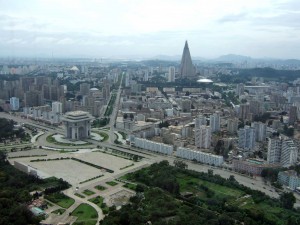 The number of British tourists has been increasing in recent years – this year alone it will be almost 500. There are nine British travel agencies who operate tours of the DPRK. Visas are never denied for tourists. I have met with some British tourists who had just returned from the DPRK, and they were so surprised to see how different it is from their impressions that they had picked up in the media. They didn’t know that the DPRK is a socialist country where there is free education, where there is free medical care, where people’s health is fully guaranteed, where there is free housing. They didn’t know all these good aspects of North Korea. Most of them, before they visit my country, imagine that our streets are full of malnourished people, that there is no decent transportation, that everyone looks sad, that there is no real cultural life, etc. But when they get to Korea they see that it is entirely different. For example, public transportation is almost free – you pay a little money but compared with what you pay in Britain or the US it is basically free. They couldn’t believe that Pyongyang city is full of big apartments and houses, built and given to the people free of charge. They were also surprised that there were so many schools, much better equipped than British state schools. They found out that North Korean children are generally at a much higher educational level than their British counterparts; that the vast majority of North Korean children enjoy free after-school activities, learning piano, violin and so on. They found out that there was no begging in the streets, no drug problems. They found out that they could leave their hotels at any time of night and go out in the streets without fearing for their safety, since there are no problems of robberies and gangs.
The number of British tourists has been increasing in recent years – this year alone it will be almost 500. There are nine British travel agencies who operate tours of the DPRK. Visas are never denied for tourists. I have met with some British tourists who had just returned from the DPRK, and they were so surprised to see how different it is from their impressions that they had picked up in the media. They didn’t know that the DPRK is a socialist country where there is free education, where there is free medical care, where people’s health is fully guaranteed, where there is free housing. They didn’t know all these good aspects of North Korea. Most of them, before they visit my country, imagine that our streets are full of malnourished people, that there is no decent transportation, that everyone looks sad, that there is no real cultural life, etc. But when they get to Korea they see that it is entirely different. For example, public transportation is almost free – you pay a little money but compared with what you pay in Britain or the US it is basically free. They couldn’t believe that Pyongyang city is full of big apartments and houses, built and given to the people free of charge. They were also surprised that there were so many schools, much better equipped than British state schools. They found out that North Korean children are generally at a much higher educational level than their British counterparts; that the vast majority of North Korean children enjoy free after-school activities, learning piano, violin and so on. They found out that there was no begging in the streets, no drug problems. They found out that they could leave their hotels at any time of night and go out in the streets without fearing for their safety, since there are no problems of robberies and gangs.
So they were shocked, and they asked me why the British media is so negative all the time about the DPRK and never mentions its positive aspects. My answer is that the media wants to depict the DPRK as an evil, as a type of hell, because they want to tell the British public that there is no alternative to capitalism, to imperialism. They want people to believe there is only one economic and political system; therefore it is against their interests to say anything positive about the socialist system.
So if people in this country want to visit North Korea, it’s easy to do so?
Yes. There are many well-known companies such as Regent Holidays, Voyagers, Koryo Tours and others that organise group tours. Because the media depicts the DPRK so badly, the number of people interested in visiting is actually getting bigger and bigger.
If you go on a tour, would you typically visit only Pyongyang?
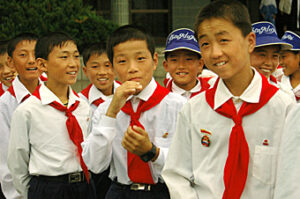 No, you can visit any place you like. There are more and more options emerging all the time. For example, many tourists want to visit for just one day, so they can do a one-day trip via the border with China. Another trip we have started is a train trip, with trains going from China to Korea. Also now there is an air trip, with outdated passenger aeroplanes (typically made in the USSR in the 50s or 60s), which are quite fashionable with many tourists. Now a New Zealand company is organising a motorcycle tour of the whole Korean peninsula. One can find such tours available on the internet.
No, you can visit any place you like. There are more and more options emerging all the time. For example, many tourists want to visit for just one day, so they can do a one-day trip via the border with China. Another trip we have started is a train trip, with trains going from China to Korea. Also now there is an air trip, with outdated passenger aeroplanes (typically made in the USSR in the 50s or 60s), which are quite fashionable with many tourists. Now a New Zealand company is organising a motorcycle tour of the whole Korean peninsula. One can find such tours available on the internet.
These tours have increased a lot over the last 3-4 years, as we have much more of the supporting infrastructure now, so the tourist industry is more open and diverse. We feel that it helps us to establish stronger cultural relations with other countries.
Each socialist country has had its own way of organising popular democracy and participation, for example the Soviets in the USSR, and the Committees for the Defence of the Revolution in Cuba – structures that allow people to manage the affairs of their workplaces and localities, solving their basic problems and electing people to higher bodies at regional and national levels. Is there something along these lines in North Korea?
Of course. We operate democracy at every level of our party and government. As you know, the major party of government is the Workers’ Party of Korea. This party is a mass party with a membership of millions, and is organised along democratic centralist lines. If someone in a given party structure (a cell) is not working according to the party line that has been discussed and agreed upon, then there would be a criticism by other party members and that member is given a chance to correct his behaviour. At each level of the party we use this system of criticism, self-criticism and accountability in order to maintain efficient and correct work.
We have a Supreme People’s Assembly, which could be considered the equivalent of the British parliament. Under this Supreme People’s Assembly, there are assemblies at province, city and county levels. The members are all elected, and these bodies meet frequently. They are responsible for taking important decisions, in a normal democratic way. For example, given a limited budget, they might have to take a vote as to whether to spend money on building a new kindergarten, or improving a hospital, and so on. In this way, broad masses of people are involved in the process of managing society. If the bodies don’t function correctly, there are mechanisms for people to criticise them and to appeal against bad decisions and negative work. For example, if water sanitation in a particular village needs to be improved, then local people can go to the council to protest. If their protest is taken into account and the situation is improved, that is good. If not, people can appeal higher up – to the city or province level – to make sure that the council is representing them properly.
Is the WPK the only political party in North Korea?
There are many parties and mass organisations besides the WPK, such as the Catholic Party and the Social Democratic Party. We do not consider that we have ‘ruling’ and ‘opposition’ parties – the parties are all on friendly terms and cooperate in developing our society. These other parties all participate in the people’s assemblies – as long as they get enough votes. They are even represented in the Supreme People’s Assembly.
People have a prejudice against our country that decisions are only made at the top by only one person, but how is this even possible? Running a country is a complicated process that needs the energy and creativity of many people.
I’m interested to understand how has DPRK been able to survive the last two decades, in such a difficult global political context. The Soviet Union – the biggest socialist country – collapsed; the people’s democracies in Eastern Europe no longer exist. How is it that, in a hostile international environment, the DPRK has been able to keep going?
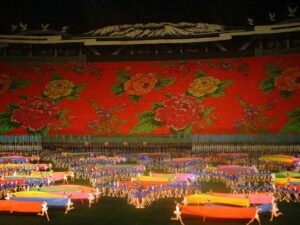 The past two decades have been the most difficult period for us. We suddenly lost our major trading partners, out of nowhere, with no warning. This had a major impact on our economy. And with the disappearance of the USSR, the US moved to a policy of intensification, believing that our days were numbered. The US intensified its economic blockade and its military threat. They stopped all financial transactions between the DPRK and the rest of the world. The US controls the flow of foreign currency: if they say that any bank will be the target of sanctions if it does business with the DPRK, then obviously that bank has to go along with them. The US issued such an ultimatum to all companies: if they do business with North Korea, they will be subject to sanctions by the US. This is still in place. The US government thought that if they cut economic relations between the DPRK and the rest of the world, we would have to submit to them. The only reason that we have been able to survive is the single-hearted unity of the people. The people united firmly around the leadership. We worked extremely hard to solve our problems by ourselves.
The past two decades have been the most difficult period for us. We suddenly lost our major trading partners, out of nowhere, with no warning. This had a major impact on our economy. And with the disappearance of the USSR, the US moved to a policy of intensification, believing that our days were numbered. The US intensified its economic blockade and its military threat. They stopped all financial transactions between the DPRK and the rest of the world. The US controls the flow of foreign currency: if they say that any bank will be the target of sanctions if it does business with the DPRK, then obviously that bank has to go along with them. The US issued such an ultimatum to all companies: if they do business with North Korea, they will be subject to sanctions by the US. This is still in place. The US government thought that if they cut economic relations between the DPRK and the rest of the world, we would have to submit to them. The only reason that we have been able to survive is the single-hearted unity of the people. The people united firmly around the leadership. We worked extremely hard to solve our problems by ourselves.
If the UK one day suddenly lost its markets in the US and Europe, would it survive? If all financial transactions are stopped, how can a country survive? And yet we did survive.
Is the global situation more favourable now for North Korea and for other countries that are pursuing an independent path?
Yes. The past two decades were very difficult: not only did we have to survive economically but we also had to frustrate US military intentions; therefore we had to put a lot of investment and focus on strengthening our army, building weapons and developing our nuclear capability. Now that we have nuclear weapons, we can reduce our military investment, because even a small nuclear arsenal can play a deterrent role. We are in a position where we can make the US hesitate to attack us. Therefore we can focus more on people’s welfare now.
Do you think that the relative economic decline of the US and Western Europe will help Korea?
We have to wait and see. It is true that US economic power is declining, but precisely because of this, the US is trying to consolidate its political and military power. At the moment, this is reflected in the ‘pivot to Asia’, which is really about China. The importance of the Korean peninsula is therefore increasing, due to its proximity to China and Russia. The Korean peninsula is sort of a pivot point from which the US thinks it can exercise control over the big powers.
The war in Syria has been a key issue in world politics over the last 2-3 years. The DRPK continues to be a supporter of, and friend to, Syria. What is the basis for this relationship?
 In the past, our late president Kim Il Sung had very comradely relations with President Hafez al-Assad. Both leaders shared the viewpoint that they should fight against imperialist policy. Syria was always a strong supporter of Palestinian self-determination, and was an important pillar against US and Israeli policy in the Middle East. Meanwhile, the DPRK was an important pillar against US policy in the Korean peninsula. So both countries share the same policy in relation to struggling against imperialist policy worldwide. This is the basis for the solidarity between the two countries.
In the past, our late president Kim Il Sung had very comradely relations with President Hafez al-Assad. Both leaders shared the viewpoint that they should fight against imperialist policy. Syria was always a strong supporter of Palestinian self-determination, and was an important pillar against US and Israeli policy in the Middle East. Meanwhile, the DPRK was an important pillar against US policy in the Korean peninsula. So both countries share the same policy in relation to struggling against imperialist policy worldwide. This is the basis for the solidarity between the two countries.
Historically, Syria was not our only friend in the Middle East: we were very close with Nasser’s Egypt and with Yasser Arafat and the PLO – these leaders and countries shared the same philosophy of independence and development. This shared philosophy still exists between Syria and North Korea.
Under the pretext of introducing human rights and democracy in the Middle East, the US and its partners are creating chaos. Their so-called ‘Arab Spring’ policy has created a situation where hundreds of innocent people are killed every day. People are fighting each other in Egypt, Syria, Iraq, Lebanon, everywhere. This is a reflection of US divide and rule policy. Israel – the most important regional partner of the US – is a small country, whereas the Arab world is quite big; so the US and Israel are afraid of the unity of the Arab world. How can they break this unity? They try to create hatred among the different political organisations, among different religious groups, among different countries. Once this hatred is created, they encourage people to fight each other. This is the “freedom” they have brought: the freedom for people to kill each other. This is the strategy for guaranteeing the security of Israel.
It is essential that the Arab people understand the policy of divide and rule. This policy has been used for hundreds of years by the British Empire, the Americans and other imperialist empires. People have to unite in order to protect their children.
Over the past 10-15 years, there have been some important changes in South and Central America, the region historically considered as the US ‘backyard’. There are now progressive governments not only in Cuba, but also in Venezuela, Nicaragua, Bolivia, Ecuador, Brazil, Argentina and Uruguay. Do you think this is a promising development?
I think so, yes. The people of South America are more conscious than ever before. Previously, Latin America was dominated by US imperialism, with most governments – many of them brutal military dictatorships – directly supported by the US. But these states didn’t improve the lives of the ordinary people. So now people have come to understand that they must break the relationship of dependency with the US. They have decided to take up their own destinies. Just look at Venezuela: Venezuela has been an oil-rich country for a long time, but only once Chávez got into power was the oil wealth distributed so that ordinary people could benefit.
The DPRK has positive relations with Latin American countries. We have now opened our embassy in Brazil. We have good relations with Nicaragua, Bolivia, Venezuela; Cuba of course. Chávez wanted to visit North Korea, but in the end his health didn’t allow it. But he always promoted good relations between Venezuela and North Korea. He is certainly very much missed.


